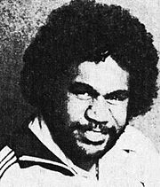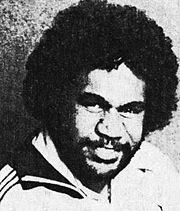
Robert Jabanungga
Encyclopedia
Robert Mellor Granites Jabanungga AKA Robert Kantilla, Robert Japanangka, Robert Japananga, Robert Jabanunga Kantilla (1946–1985) was a TV actor, Aboriginal dancer and musician best known for playing the didgeridoo
at many Canberra festivals as well as national and international events. Jabanungga Avenue in the Canberra
suburb of Ngunnawal
is named in his honour. The word Jabanungga is a tribal name which means 'Peaceful land'.
 Robert was born in 1946 in Yuendumu a settlement established by the Federal government to deliver rations and welfare services to the Walpiri people. Raised as a Walpiri, he had eight brothers and eight sisters and lived in a humpy
Robert was born in 1946 in Yuendumu a settlement established by the Federal government to deliver rations and welfare services to the Walpiri people. Raised as a Walpiri, he had eight brothers and eight sisters and lived in a humpy
and hunted kangaroo
s, goanna
s, lizard
s and snake
s. He received a traditional Aboriginal education including bush craft, tribal rites and ceremonies.
The Yuendumu community operated within the bounds of a native affairs policies of forced assimilation. His cousins were members of the (Aboriginal) lost generation, in that the authorities forcibly removed them from their tribe and placed them into foster care in a white community.
Jabanungga's tribal group was moved to Mt Doreen Cattle Station, west of Yuendumu and later still to Warrabri, another settlement, where he received the western education alongside his native one.
He was eventually placed with the Mellor family who lived in Alice Springs. Here he finished his schooling and started a butchers apprenticeship. He worked for three years in a local butchers shop. He adopted their family name for a time. During the late 1960s he spent a few years in Adelaide. He relocated to Melbourne in the early 1970s where he worked as a teacher aide at the newly established Debney Meadows Primary School. The school had just introduced a performing arts program integrated with its Australian history syllabus where Robert taught student about aboriginal cultural studies including the corroboree
.
Aboriginal actors were in demand for Australia's expanding Television industry. He found sporadic work in particular in the ABC-TV series Bellbird
and Channel 7's Cash and Co (Tandarra) . Through the 1970s, Robert travelled to Malaysia, Hong Kong and other parts of Asia playing didgeridoo and dancing. He worked as an Aboriginal Culture Advisor for the Victorian Department of Education and Special Services. During the 1980s Jabanungga worked at Aboriginal Studies at ‘Birrigai’, one of Australia’s foremost Indigenous Outdoor Education Centres situated in the Brindabella Range, south west of Canberra. Jabanungga died at the age of 39 in 1985.
interviewed Jabanungga for the award winning book 'Living Black: Blacks Talk to Kevin Gilbert'.
Didgeridoo
The didgeridoo is a wind instrument developed by Indigenous Australians of northern Australia around 1,500 years ago and still in widespread usage today both in Australia and around the world. It is sometimes described as a natural wooden trumpet or "drone pipe"...
at many Canberra festivals as well as national and international events. Jabanungga Avenue in the Canberra
Canberra
Canberra is the capital city of Australia. With a population of over 345,000, it is Australia's largest inland city and the eighth-largest city overall. The city is located at the northern end of the Australian Capital Territory , south-west of Sydney, and north-east of Melbourne...
suburb of Ngunnawal
Ngunnawal, Australian Capital Territory
Ngunnawal is a suburb in the district of Gungahlin in Canberra, Australia. The suburb is named in tribute to the Ngunnawal people, the original inhabitants of the area. The suburb was gazetted on 18 October 1991. Ngunnawal is adjacent to the suburbs of Nicholls, Casey and Amaroo and Taylor...
is named in his honour. The word Jabanungga is a tribal name which means 'Peaceful land'.
Early life

Humpy
A humpy is a small, temporary shelter made from bark and tree branches, traditionally used by Australian Aborigines, with a standing tree usually used as the main support...
and hunted kangaroo
Kangaroo
A kangaroo is a marsupial from the family Macropodidae . In common use the term is used to describe the largest species from this family, especially those of the genus Macropus, Red Kangaroo, Antilopine Kangaroo, Eastern Grey Kangaroo and Western Grey Kangaroo. Kangaroos are endemic to the country...
s, goanna
Goanna
Goanna is the name used to refer to any number of Australian monitor lizards of the genus Varanus, as well as to certain species from Southeast Asia.There are around 30 species of goanna, 25 of which are found in Australia...
s, lizard
Lizard
Lizards are a widespread group of squamate reptiles, with nearly 3800 species, ranging across all continents except Antarctica as well as most oceanic island chains...
s and snake
Snake
Snakes are elongate, legless, carnivorous reptiles of the suborder Serpentes that can be distinguished from legless lizards by their lack of eyelids and external ears. Like all squamates, snakes are ectothermic, amniote vertebrates covered in overlapping scales...
s. He received a traditional Aboriginal education including bush craft, tribal rites and ceremonies.
The Yuendumu community operated within the bounds of a native affairs policies of forced assimilation. His cousins were members of the (Aboriginal) lost generation, in that the authorities forcibly removed them from their tribe and placed them into foster care in a white community.
Jabanungga's tribal group was moved to Mt Doreen Cattle Station, west of Yuendumu and later still to Warrabri, another settlement, where he received the western education alongside his native one.
He was eventually placed with the Mellor family who lived in Alice Springs. Here he finished his schooling and started a butchers apprenticeship. He worked for three years in a local butchers shop. He adopted their family name for a time. During the late 1960s he spent a few years in Adelaide. He relocated to Melbourne in the early 1970s where he worked as a teacher aide at the newly established Debney Meadows Primary School. The school had just introduced a performing arts program integrated with its Australian history syllabus where Robert taught student about aboriginal cultural studies including the corroboree
Corroboree
A corroboree is a ceremonial meeting of Australian Aborigines. The word was coined by the European settlers of Australia in imitation of the Aboriginal word caribberie. At a corroboree Aborigines interact with the Dreamtime through dance, music and costume. Many ceremonies act out events from the...
.
Aboriginal actors were in demand for Australia's expanding Television industry. He found sporadic work in particular in the ABC-TV series Bellbird
Bellbird (TV series)
Bellbird was an Australian soap opera set in a small Victorian rural township. The series was produced by the Australian Broadcasting Corporation at its Ripponlea TV studios in Elsternwick, Melbourne, Victoria. The series was produced between 28 August 1967 and December 1977...
and Channel 7's Cash and Co (Tandarra) . Through the 1970s, Robert travelled to Malaysia, Hong Kong and other parts of Asia playing didgeridoo and dancing. He worked as an Aboriginal Culture Advisor for the Victorian Department of Education and Special Services. During the 1980s Jabanungga worked at Aboriginal Studies at ‘Birrigai’, one of Australia’s foremost Indigenous Outdoor Education Centres situated in the Brindabella Range, south west of Canberra. Jabanungga died at the age of 39 in 1985.
Commentator
Robert like many of his generation experienced the culture wars between the indigenous and white communities. He witnessed the brutal regime at Mt Doreen station where the station owner treated 'the blacks' as slaves. Aboriginal writer and activist Kevin GilbertKevin Gilbert (author)
Kevin Gilbert was a 20th century Indigenous Australian activist, artist, poet, playwright and printmaker. He is also a past winner of the National Book Council prize for writers.- Life :...
interviewed Jabanungga for the award winning book 'Living Black: Blacks Talk to Kevin Gilbert'.
’Suffering is that the white people class them as the lowest person on earth. Modern Aboriginals are victims of this chain of historical events. I believe that Aborigines should come to view their background a bit more realistically on the surface and with a bit less shame underneath.
Aboriginal people were forced to work, if they didn’t, the station owners called the police in. I always thought Australia was different to America, but we had slavery here, too. The people might not have been sold on the blocks like the American Negroes were, but they were owned, just the same.’.
Acting Credits
| Cash and Co (credited as Jabanunga Kantilla) 1974 - 1975 |
| Bellbird (ABC-TV) |

